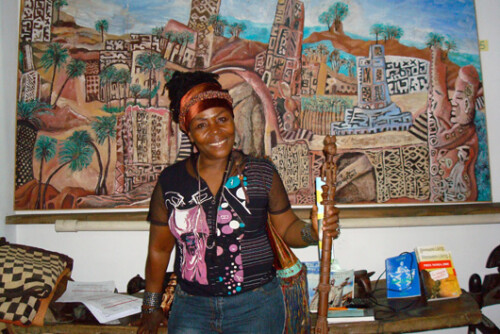The Scholar & Feminist XIX: Women as Change Makers: Building and Using Political Power brought together over 50 prominent women in political life to explore the relationship between women and the state. Participants explored how women gain power in the public domain, what they tend to do once they’ve got it, and what they should do to secure and expand it. For the 30th anniversary conference, former BCRW director Leslie Calman returned to continue the conversation with progressive voices from the academy, philanthropy, the media and political activism. Participants included:
- Amrita Basu, Professor of Political Science and Women’s Studies, Amherst College
- Alison Bernstein, Vice President of Knowledge, Creativity and Freedom, The Ford Foundation
- Terry O’Neill, Membership Vice President, National Organization for Women
- Rachel Maddow, Host of “The Rachel Maddow Show,” Air America Radio
- Faye Wattleton, President, Center for the Advancement of Women
Leslie Calman opened this lively discussion by asking if an identifiable women’s movement still exists. Unanimously, the panel agreed that women’s movements remain a vital force in struggles for social justice, although several participants insisted that much of the most exciting and cutting-edge work is being done outside the United States. Amrita Basu pointed to the fact that feminists, both in America and abroad, are “often at the forefront of struggles around human rights and civil liberties,” and have often sought to connect movements for sex and gender equality to movements to campaigns against racism, poverty, and other forms of persecution. Alison Bernstein followed-up by emphasizing the global context for the activity of women’s movement: to realize the force of feminisms today, we need to take this broad context into account.
Although feminists have made undeniable progress in the last thirty years, we have also witnessed a recent and disturbing worldwide trend toward cultural conservatism and religious fundamentalism that seek, according to Faye Wattleton, “a more restricted, defined role for women in our society.” In America, largely by co-opting the language of “values,” the religious right has amassed a large, successful and extremely powerful voting block. What, Leslie Calman asked, might those on the left learn from the strategies that brought about those successes? A spirited discussion followed in which Terry O’Neill argued that, although discussions of values and religion often leave liberals feeling uncomfortable, it is necessary for progressives to deal with these issues. After all, she reminds us, religious fundamentalism goes hand-in-hand with other systems that rely on hierarchy and exploitation, such as globalization and patriarchy. It’s also necessary to reclaim the vocabulary of “values,” which have been used to recruit millions of centrist Americans into political alliances with which they may not fully agree. While most of the panelists discussed the notion of “values” as a major hurdle that the left must learn how to clear successfully, Rachel Maddow disagreed. Advocating a “pocketbook politics,” she urged the left to focus on politics that privilege more practical matters – accessible healthcare, a living minimum wage, secured nuclear power facilities – over values-based issues.
Next, Leslie Calman asked the panelists to discuss their own personal experiences as feminists, particularly the moments that had been most difficult for them as feminists. Rachel Maddow noted the challenges of overcoming the stereotype that women were natural consensus builders and the lack of support she has felt, as a result, for her “approach to feminist issues (and [her] approach to all the political issues [she’s] ever worked on), which is confrontation.” Faye Wattleton, whose current work is dedicated to building a political think tank to counter those of the right, echoed Rachel’s concerns, speaking of the necessity of triggering “a revolution” from within feminism, as did Alison Bernstein, who described the difficulties of “living with, through and beyond” a women’s movement that was so often blind to issues of race and class.
Text: Full Transcript (PDF, 176 KB)
Video Clips:Play Clip 1
Leslie Calman, Terry O’Neill, Allison Bernstein, Faye Wattleton, and Rachel Maddow discuss not only the ways in which the religious right has used the language of “values” to hijack fruitful and meaningful political debate, but also the promises and the perils that the left faces when it engages in “values-based” politics




